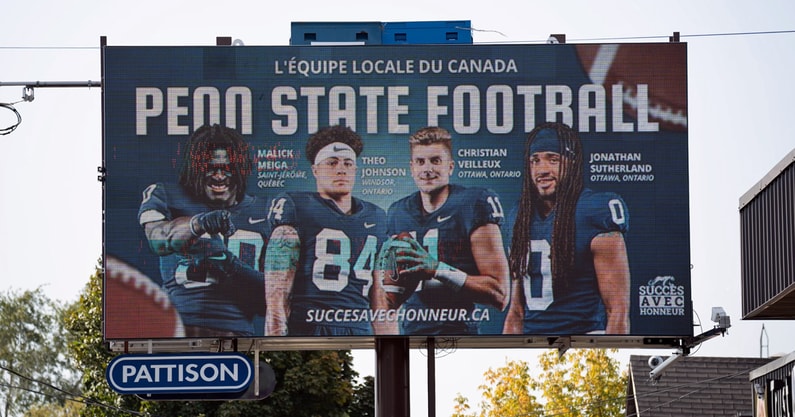Penn State collective Success With Honor launches NIL ad in a foreign language

When the NCAA adopted its interim NIL policy, it quickly became clear that the nearly 20,000 international student-athletes who compete in one of the NCAA’s three divisions could not monetize their brands the same way that their American teammates can. Yet, that has not stopped collectives from being savvy enough to find creative ways to support international student-athletes. Take what is happening North of the border with Penn State-focused collective Success With Honor.
Success With Honor recently launched billboards in Toronto and Ontario, Canada, highlighting Jonathan Sutherland, Theo Johnson, Christian Veilleux and Malick Meiga, the four Canadian student-athletes on the Penn State football team.
Student Athlete NIL, Success With Honor’s parent company, is also running similar campaigns for basketball players at other schools it’s representing in France, Indonesia, Ireland, England and Australia. Along with Success With Honor, Student Athlete NIL operates collectives such as Knights of The Raritan at Rutgers, Crimson and Cream at Oklahoma and multiple other schools.
“It’s a way to involve international student-athletes in NIL passively in their home countries,” Student Athlete NIL CEO Jason Belzer told On3. “Not only are they promoting the collective, but the university is getting value at the same time.”
Additionally, another unique feature of the Student Athlete NIL campaign is that the billboards also feature the native language of the student-athlete’s homeland. The Success With Honor billboard features the tagline “L’Équipe locale Du Canada,” which translates to the Home Team of Canada. The advertisement also features a Canadian web domain – SuccesAvecHonneur.ca. And the collective logo has also been translated into French to include “Success Avec Honneur.”
“We’re definitely the first to do it,” Belzer said. “And most certainly, we’re the first NIL advertisement in a foreign language.”
Navigating NIL for international student-athletes
Individuals who are in the U.S. on an F-1 visa are allowed to earn passive income, but they can’t do typical NIL deals with companies as American student-athletes can.
In short, passive income is that in which the recipient doesn’t have to actively participate in a business or trade. Multiple attorneys and Division I athletic department employees told On3’s Andy Wittry they believe group licensing income could qualify as passive income.
Top 10
- 1New
Bowl Projections
Full list of matchups
- 2
Top Target: Kiffin
Why UF should pursue Ole Miss HC
- 3Hot
Coaching Carousel
Hot seat intel
- 4Trending
Shane Beamer
Denies Hokies rumors
- 5
AP Poll
Massive shakeup in Top 25
Get the Daily On3 Newsletter in your inbox every morning
By clicking "Subscribe to Newsletter", I agree to On3's Privacy Notice, Terms, and use of my personal information described therein.
And, as Wittry recently reported, it could be a game-changer for high-profile international athletes in terms of their NIL opportunities in the U.S.
Kentucky forward Oscar Tshiebwe, the reigning Naismith Men’s College Player of the Year who’s from the Democratic Republic of Congo, has been “able to license his name, image and likeness – a lucrative loophole that is netting him about $20,000 a month in just apparel sales,” according to The Athletic.
However, as shown by the recent example of Cincinnati’s Australian punter Mason Fletcher, who announced the income from his replica jerseys will go to a scholarship fund for the team’s walk-ons, university administrators will typically be conservative in their guidance so as not to risk their athletes’ visa statuses.
It’s become such an important topic in the NIL world, that Illinois State recently held an International Student-Athlete Name, Image & Likeness Forum to provide guidance.
“The university can’t do anything about it,” said Maya Bulger, Illinois State’s director of NIL and Community Engagement Director of Social media. “The NCAA can’t do anything about it right now. But we can advocate for you and find ways for you to capitalize in the ways that you can. As a university and as an athletic department, that’s our responsibility.”